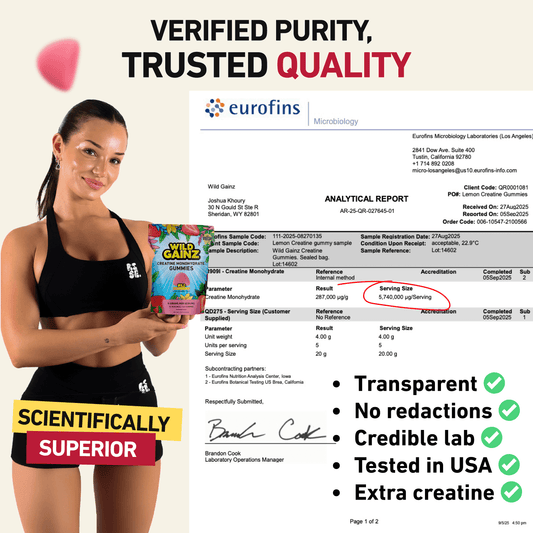Creatine has long been regarded as sports nutrition's best kept secret, delivering remarkable results to fitness enthusiasts and athletes alike. Whether you're a seasoned gym-goer or just starting out on your fitness journey, understanding the real effects of creatine can be a game-changer in optimizing your performance. From enhancing strength and boosting muscle growth to accelerating recovery, the benefits of creatine are impressive. In this friendly guide, we'll dive into the science behind creatine, explore the "before and after" transformations, and provide practical tips on how to take creatine effectively. Get ready to unlock your full potential and see why so many athletes swear by this powerful supplement!
Creatine Benefits Unveiled
Boosting Athletic Performance
Creatine's impact on athletic performance is nothing short of impressive. It's a go-to supplement for athletes looking to gain an edge in their training and competitions. By increasing the body's phosphocreatine stores, creatine helps replenish ATP (adenosine triphosphate) more quickly, giving you that extra burst of energy during high-intensity, short-duration activities. This means you can push harder during weightlifting sessions, sprint faster on the track, or power through those last few reps in your workout. Studies have shown that creatine can improve performance in activities lasting up to 30 seconds by up to 15%. It's not just for powerlifters or sprinters, though - even endurance athletes can benefit from creatine's ability to delay fatigue and improve recovery between intense efforts. Whether you're aiming for a new personal best or just want to get more out of your workouts, creatine can be a game-changer for your athletic performance.
Enhancing Muscle Growth
Creatine isn't just about performance - it's a powerhouse for muscle growth too. When you take creatine, your muscles retain more water, giving them a fuller, more pumped look. But it's not just about aesthetics. This increased cell volumization can actually trigger protein synthesis and reduce protein breakdown, leading to real muscle growth over time. Creatine also boosts insulin-like growth factor 1 (IGF-1), a key player in muscle development. Studies have shown that combining creatine supplementation with resistance training can lead to significantly greater increases in muscle mass compared to training alone. It's like giving your muscles a helping hand, allowing you to train harder and recover faster. So if you're looking to pack on some serious muscle, creatine could be your secret weapon. Just remember, it's not a magic pill - you still need to put in the work at the gym!
Improving Recovery Times
One of the unsung heroes in creatine's arsenal of benefits is its ability to speed up recovery. After an intense workout, your muscles need time to repair and grow stronger. Creatine can help accelerate this process in several ways. First, it reduces muscle damage and inflammation during exercise, which means less soreness and faster bounce-back time. It also enhances glycogen replenishment, helping your muscles refuel more efficiently. This is crucial for athletes who train frequently or compete in multiple events. Moreover, creatine's cell-volumizing effect can help reduce muscle protein breakdown, preserving your hard-earned gains. Some studies even suggest that creatine might help with sleep quality, which is essential for optimal recovery. By shortening your recovery time, creatine allows you to train more frequently and consistently, leading to better long-term results. It's like having a recovery fast-forward button - who wouldn't want that?
Creatine Before and After Insights
Transformative Body Changes
When it comes to creatine before and after results, the transformations can be truly impressive. Many users report noticeable changes within just a few weeks of consistent use. Initially, you might see a quick increase in body weight due to water retention in the muscles - don't worry, this isn't fat gain! As you continue using creatine and training hard, you'll likely notice more defined muscles and increased muscle volume. Over time, the real magic happens: significant gains in lean muscle mass and strength. It's not uncommon for users to add 2-4 pounds of muscle in their first month of creatine use, with continued gains over time. Remember, individual results can vary based on factors like diet, training intensity, and genetics. Creatine isn't a shortcut to a dream physique, but it can certainly help you get there faster when combined with proper nutrition and a solid workout routine.
Real User Testimonials
Don't just take our word for it - let's hear from real people who've experienced the creatine effect firsthand. John, a 28-year-old gym enthusiast, shares, "After three months of creatine use, I've added 20 pounds to my bench press and my arms are visibly bigger." Sarah, a CrossFit athlete, notes, "Creatine has been a game-changer for my workouts. I recover faster and can push through high-intensity sessions like never before." Even older adults are seeing benefits. Tom, 55, reports, "I've been using creatine for six months and I feel stronger than I did in my 40s. My muscle tone has improved significantly." These testimonials highlight the diverse benefits of creatine, from strength gains and muscle growth to improved endurance and faster recovery. While individual results may vary, these real-life experiences demonstrate why creatine has become a staple in many fitness enthusiasts' supplement regimens.
Myths vs. Reality
Let's bust some common myths about creatine effects. Myth #1: Creatine is a steroid. Reality: It's a naturally occurring compound in our bodies and food. Myth #2: Creatine causes kidney damage. Reality: Studies show it's safe for healthy individuals. Myth #3: Creatine is only for bodybuilders. Reality: It benefits various athletes and even has cognitive perks. Myth #4: Creatine makes you gain fat. Reality: The initial weight gain is water retention, not fat. Myth #5: You need to cycle creatine. Reality: Continuous use is safe and effective for most people. Myth #6: Creatine works instantly. Reality: While some effects are quick, full benefits take weeks to develop. Understanding these myths vs. realities helps you make informed decisions about creatine use. Remember, while creatine is generally safe and effective, it's always wise to consult with a healthcare professional before starting any new supplement regimen.
How to Take Creatine Effectively
Dosage and Timing Tips
Getting the most out of creatine isn't just about taking it - it's about taking it right. The standard dose is 3-5 grams per day, which maintains optimal creatine levels in your muscles. Some people start with a "loading phase" of 20 grams per day for 5-7 days to saturate their muscles quickly, but it's not necessary. As for timing, there's flexibility. You can take it pre-workout for an energy boost, post-workout to aid recovery, or any time of day for general benefits. Consistency is key - take it daily, even on rest days. Mix it with water or your favorite beverage, but avoid acidic drinks as they can break down creatine. Hot beverages are also a no-go, as heat degrades creatine. Remember, creatine works best when paired with a balanced diet and regular exercise. It's not a replacement for hard work, but rather a tool to enhance your efforts.
Loading Phase Explained
The creatine loading phase is a strategy to rapidly saturate your muscles with creatine. Here's how it works: for 5-7 days, you take 20 grams of creatine daily, usually split into four 5-gram doses. This approach can quickly elevate your muscle creatine levels, potentially leading to faster initial results. After the loading phase, you drop down to a maintenance dose of 3-5 grams per day. While effective, the loading phase isn't mandatory. You can achieve the same saturation levels by consistently taking 3-5 grams daily for about 28 days. So why choose one over the other? Loading gets you there faster but may cause mild digestive discomfort for some. The gradual approach is gentler but takes longer to see full benefits. Either way, once your muscles are saturated, the effects are the same. Choose the method that fits your goals and comfort level best.
Maintaining Optimal Levels
Once you've reached optimal creatine levels in your muscles, whether through loading or gradual intake, maintaining those levels is key to reaping long-term benefits. The standard maintenance dose is 3-5 grams per day. This amount replenishes what your body uses naturally and through exercise. Consistency is crucial - take your creatine every day, even on rest days. Some people worry about cycling creatine, but research shows that continuous use is safe for healthy individuals. If you miss a day, don't worry - just resume your normal dosage the next day. There's no need to double up. Remember, creatine works best when combined with proper hydration, so aim to drink plenty of water throughout the day. Also, pair your creatine intake with a balanced diet rich in protein to maximize its muscle-building potential. With these simple strategies, you can maintain optimal creatine levels and continue to enjoy its performance-enhancing effects.
Understanding Creatine Effects
Short-Term vs. Long-Term Results
Creatine's effects can be both immediate and long-lasting, making it a versatile supplement for various fitness goals. In the short term, you might notice increased muscle fullness and slight weight gain due to water retention in your muscles. This can happen within the first week of use. You may also experience improved performance in high-intensity, short-duration activities almost immediately. However, the real magic of creatine unfolds over time. Long-term use, combined with consistent training, can lead to significant increases in muscle mass, strength, and overall athletic performance. Studies show that after 8-12 weeks of creatine supplementation, users can see up to 8% increase in strength and a 14% increase in weightlifting performance. Remember, while short-term effects can be motivating, it's the long-term, consistent use that truly transforms your fitness journey.
Side Effects and Precautions
While creatine is generally safe for most people, it's important to be aware of potential side effects and take necessary precautions. Some users may experience mild digestive issues, muscle cramps, or weight gain due to water retention, especially during the loading phase. These effects are usually temporary and subside as your body adjusts. To minimize discomfort, start with a lower dose and gradually increase it. Stay well-hydrated, as creatine can increase water retention in muscles. If you have pre-existing kidney or liver conditions, consult your doctor before starting creatine. Pregnant or breastfeeding women should also avoid creatine due to lack of research on its effects in these populations. It's worth noting that creatine doesn't suit everyone's goals - if you're an endurance athlete or trying to lose weight, the water weight gain might not align with your objectives. Always listen to your body and discontinue use if you experience any adverse reactions.
Combining with Other Supplements
Creatine plays well with others in the supplement world, often enhancing the effects of a well-rounded supplement stack. Pairing creatine with protein powder can boost muscle growth and recovery, as both support protein synthesis. Beta-alanine, another popular supplement, works synergistically with creatine to improve muscular endurance and reduce fatigue. Some athletes combine creatine with caffeine for an extra pre-workout energy kick, although it's best to take them at different times to avoid potential interference. Creatine also pairs well with carbohydrates, which can help improve its absorption. However, it's important not to go overboard. More isn't always better when it comes to supplements. Stick to proven combinations and always introduce new supplements one at a time to monitor their individual effects. Remember, supplements should complement a balanced diet and consistent training regimen, not replace them.
The Role of Creatine in Sports Nutrition
Supporting Intense Training Regimens
Creatine is a powerhouse when it comes to supporting intense training regimens. It's particularly beneficial for high-intensity, short-duration activities like weightlifting, sprinting, and HIIT workouts. By increasing your body's phosphocreatine stores, creatine helps regenerate ATP (adenosine triphosphate) more quickly. This means you can maintain high-intensity effort for longer periods, pushing out those extra reps or sprints that make all the difference. Creatine also aids in reducing muscle damage and inflammation during intense workouts, which can lead to faster recovery times. This allows athletes to train more frequently and at higher intensities without overtraining. Moreover, the increased cell volumization from creatine can enhance protein synthesis, supporting muscle growth and repair after grueling sessions. For athletes engaged in sports that require explosive power and repeated bursts of energy, creatine can be a game-changer in their nutrition strategy.
Creatine for Different Sports
While creatine is often associated with weightlifting and bodybuilding, its benefits extend to a wide range of sports. In football, rugby, and hockey, creatine can enhance explosive power for tackles, sprints, and shots. Swimmers and track athletes benefit from improved sprint performance and reduced fatigue between heats. Even combat sports like boxing and MMA can leverage creatine's ability to boost short-burst energy and recovery. For team sports like basketball and soccer, creatine can improve high-intensity movements like jumps and quick direction changes. Surprisingly, endurance athletes like cyclists and long-distance runners can also benefit, as creatine may improve anaerobic capacity during crucial moments like hill climbs or final sprints. However, the water weight gain from creatine might not suit some weight-class based sports or activities where every ounce matters. As always, athletes should consider their specific sport's demands and personal goals when deciding to incorporate creatine into their nutrition plan.
Future of Creatine Supplementation
The future of creatine in sports nutrition looks promising, with ongoing research unveiling new potential benefits and applications. Scientists are exploring creatine's role in cognitive function, potentially extending its use beyond physical performance to mental acuity in sports. There's also growing interest in creatine's therapeutic applications, such as treating muscular dystrophies and neurodegenerative diseases. In terms of formulations, we may see more tailored creatine products, like fast-absorbing versions for pre-workout use or slow-release formulas for sustained benefits. Personalized supplementation based on genetic profiles could become a reality, optimizing creatine intake for individual needs. As our understanding of creatine's mechanisms deepens, we might discover synergies with other compounds, leading to more effective supplement stacks. With its proven track record and ongoing research, creatine is likely to remain a cornerstone of sports nutrition while expanding into new territories of health and performance enhancement.





